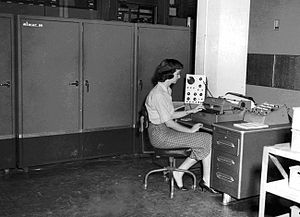ALWAC III-E

The ALWAC III-E was an early commercial vacuum-tube computer employing a rotating magnetic drum main storage unit,[1] operational in 1955. It weighed about 2,200 pounds (1.1 short tons; 1.00 t).[2]
The invention of the ALWAC III-E is attributed to Axel Wenner-Gren,[3] and the name is derived from Axel Leonard Wenner-Gren Automatic Computer,[4] letter E stands for the E-register (index register).[5][6] The ALWAC III-E contained 132[3]–275[1] vacuum tubes, 5000[3]–5400[1] silicon diodes, and cost $60,000[1]–$80,000.[3][4] Word size was 32 bits + sign + recoverable overflow bit.[3]
Instruction execution times (including average memory access times) were 5.25–5.75 milliseconds for addition and subtraction, and 21.25 ms for multiplication and division.[1]
An ALWAC III-E was installed at the University of British Columbia in March 1957 and remained in service until October 1961. Others were installed at Oregon State University (then College)[4] and Loyola Marymount University (then Loyola University of Los Angeles). An ALWAC III-E was installed by the CIA in September, 1957 in the offices of the Photographic Intelligence Division. Located at Fifth and K streets NW. and given the name Project Automat, the ALWAC was used to analyze pictures taken by U-2 spy planes.
Memory
"The arithmetic registers of the ALWAC computer are circulating loops of information one word in length. The information is changed when the magnetic writing head is switched to an input device or to some reading head other than the one which makes up the loop with it. In addition to four one-word registers, the drum has four 32-word channels of working storage from which instructions are picked up to be carried out and data picked up to be operated on in the arithmetic registers. The working storage, through what is essentially a loop arrangement, has faster access than the remainder of the drum, the main storage. "Main storage consists of 128 channels, 32 words in each. Any main-storage channel may be copied in a block to one of the working-storage channels, and a working-storage channel may be copied in a block to any main channel."[7]
Wegematic 1000

In 1960 Wenner-Gren Centre Foundation donated a Wegematic 1000 (based on ALWAC III-E) computer to the University of Turku in Turku, Finland.[8][9]
Further reading
- Impagliazzo, John; Järvi, Timo; Paju, Petri (2009). "2. The ALWAC IIIE Computer". History of Nordic Computing 2: Second IFIP WG 9.7 Conference, HiNC 2, Turku, Finland, August 21-23, 2007, Revised Selected Papers. Springer Science & Business Media. pp. 95–100. ISBN 9783642037566.
References
- ^ a b c d e DUBINSKI, GEORGE ANTHONY (June 1960). "SYSTEMS ANALYSIS OF THE ALWAC III-E DIGITAL COMPUTER" (PDF). ScholarsArchive@OSU. Oregon State University. Retrieved 2016-08-11.
- ^ Weik, Martin H. (March 1961). "ALWAC III E". ed-thelen.org. A Third Survey of Domestic Electronic Digital Computing Systems.
- ^ a b c d e "ALWAC III-E". Computer Science - People and Milestones. The University of British Columbia. Archived from the original on 2017-12-20. Retrieved 2016-08-11.
- ^ a b c Törn, Aimo (December 1, 2000). "Wegematic 1000". Early History of Computing in Turku, 1959-1964. Åbo Akademi (University). Retrieved 2016-08-11.
- ^ Impagliazzo, John; Järvi, Timo; Paju, Petri (2009). History of Nordic Computing 2: Second IFIP WG 9.7 Conference, HiNC 2, Turku, Finland, August 21-23, 2007, Revised Selected Papers. Springer Science & Business Media. p. 96. ISBN 9783642037566.
- ^ "4. ALWAC III (Logistics Research, Inc.)". Digital Computer Newsletter. 8 (1): 4. Jan 1956. Archived from the original on April 6, 2019.
- ^ "DESCRIPTION OF OPERATIONS ALWAC III ELECTRONIC DIGITAL COMPUTER" (PDF). LOGISTICS RESEARCH, INC. Retrieved 2016-08-11.
- ^ "Wegematic 1000". Suomen Tietojenkäsittelymuseoyhdistys.
- ^ Suominen, Jaakko; Paju, Petri; Törn, Aimo (16 June 2003). The Wegematic 1000 Computing Center, 1959–1964. Vol. 174. pp. 464, 468–471, 479, 480–481, 485. doi:10.1007/0-387-24168-x_40. ISBN 978-0-387-24167-8.
{{cite book}}:|journal=ignored (help)
External links
- Photo of ALWAC III-E at UBC: "ALWAC III-E". www.cs.ubc.ca. Archived from the original on 2018-09-25. Retrieved 2018-09-24.
- "ALWAC, ALWAC III and III-E documents". www.bitsavers.org.
